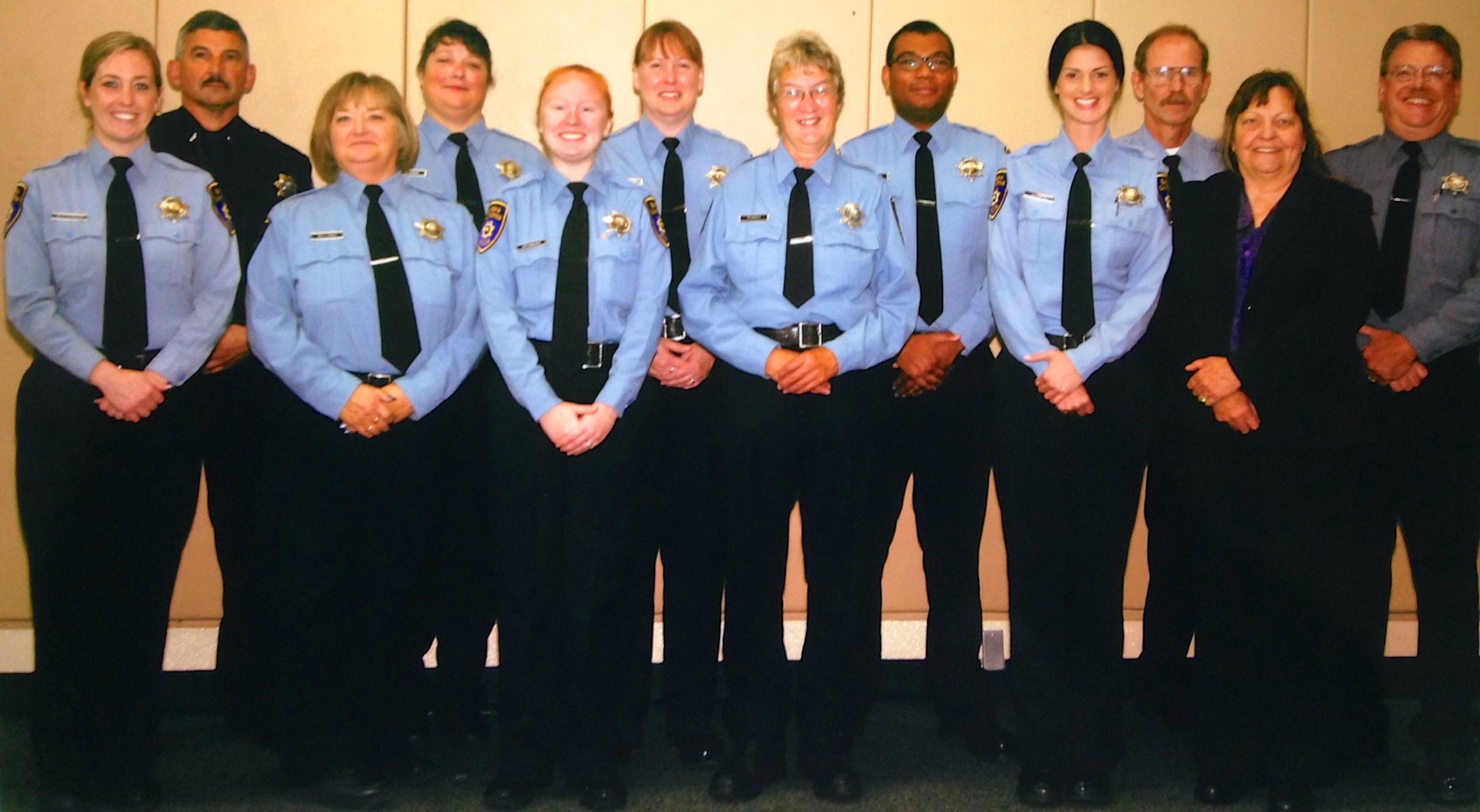 Police Services Officers | Photo courtesy Eureka Police Department
Police Services Officers | Photo courtesy Eureka Police Department
Like the rest of the Eureka Police Department’s nine police services officers, Jessica Miyamura did not see the news coming. Like those other PSOs — and like most everyone in Eureka, for that matter — Miyamura assumed EPD jobs were pretty secure after November’s passage of Measure Q, an extension of the city’s half-percent sales tax dedicated to essential public services, public safety in particular.
So when she found out late last month that her job is slated for elimination, along with the jobs of every other PSO, annuitant and temporary worker in the department, she had to stop and reevaluate her life — because unlike the rest of the PSOs, Miyamura has a newborn at home. She and her husband discussed the unexpected situation for about a week before deciding to put their house up for sale, immediately.
“My husband and I can’t afford to live here on just his salary, especially with the new baby,” she told the Outpost last week, her infant daughter Chloe asleep on her chest. Miyamura thinks maybe she’ll be able to get a job with the Humboldt County Sheriff’s Office (which has announced three open positions come July), but the background process could take up to six months, and mortgage payments add up quickly.
 Miyamura and her infant daughter were resting on a plush couch in the home of Suzie Owsley, the department’s longest-serving PSO. (She’s been doing the job since 1991.) Also seated around Owsley’s living room were four other PSOs, all hoping to inform the public a bit more about what they do in the hopes that political pressure might save their jobs. Those jobs may not require the training or carry the authority of sworn police officers, but nonetheless, they argue, all nine of them perform essential functions for the community, from picking up garbage and writing parking tickets to monitoring sex offenders, dusting for fingerprints and connecting the homeless and mentally ill to services.
Miyamura and her infant daughter were resting on a plush couch in the home of Suzie Owsley, the department’s longest-serving PSO. (She’s been doing the job since 1991.) Also seated around Owsley’s living room were four other PSOs, all hoping to inform the public a bit more about what they do in the hopes that political pressure might save their jobs. Those jobs may not require the training or carry the authority of sworn police officers, but nonetheless, they argue, all nine of them perform essential functions for the community, from picking up garbage and writing parking tickets to monitoring sex offenders, dusting for fingerprints and connecting the homeless and mentally ill to services.
With budget cuts looming for every city department, Eureka Police Chief Andy Mills was told he’d have to cut more than a million dollars from his department’s budget. Through careful analysis and negotiation Mills was able to scale that requirement down to $834,000 in cuts, he said, but that still means people will lose their jobs.
“One of the things people need to understand is that virtually all we have is personnel costs,” Mills explained yesterday. “It’s not like the military where they have aircraft and barracks … . Almost all of our money is tied up in personnel.”
Which means that’s the only place to cut.
“I don’t want in any way to diminish value they bring,” Mills said of PSOs. “But when I have to look at laying off people who can handle all of the spectrum of things policing involves versus just some of the things … .” The decision becomes clear, he suggested.
But the PSOs sitting in Suzie Owlsey’s living room aren’t going to lay down and accept being laid off. They may not all have infants at home, but it’s clear from the enthusiasm they display while describing their day-to-day activities and defending their value to the department that the job is more than just a paycheck to them.
“It is hard work,” said Linda Schwend, whose duties involve criminal investigation matters such as missing persons work, cell phone extractions and fingerprinting. “A lot of times it’s very enjoyable. It’s nice to help people feel that they’re important.”
All six women stressed this point, that PSOs not only do police work but they also serve as liaisons between the sworn officers and the community. “We can take the time to explain things to people,” Miyamura said. “We’re not as rushed as officers.”
Lyn Williams, who does vehicle abatement, said that’s important when, for example, someone’s had things stolen from their car. “We go out and give people the face-to-face interaction that they feel, at that time, they need,” Williams said. “They’ve been invaded. They’re car’s been broken into. That’s their space.” PSOs can help ease the trauma of such events.
Brittany Powell, the EPD’s public information officer, said she and her fellow PSOs have a lot of support within the department. “I think the patrol officers are some of the most thankful of us,” she aid. “They over and over and over say how thankful they are. We respond to collisions, help block traffic, take traffic reports. They take a lot of time.”
Other PSOs said there’s more at stake than grunt work and community relations. PSO Stacy Hanson Keeps track of all the sex offenders in Eureka, a full-time job, she said. “I check up on them to make sure they’re where they say they are, make sure as best I can that they’re not doing anything they’re not supposed to be doing,” Hanson said. “If you get rid of the person doing that full-time and give it to whoever they plan to give it to, they’re not gonna have the time, like I do, to keep track of these people. And I’ve been doing it for seven years, so I have a lot of knowledge and training.”
Schwend said the department likely won’t have a dedicated missing persons officer, either.
Owsley hasn’t given up hope just yet. “Myself, I’m still optimistic that something will change,” she said, “because I just don’t see how our department will run well — or run smoothly — with no police services officers. It just seems impossible.”
According to stats provided by Owsley, PSOs took about 16 percent of the EPD’s 10,716 police reports in 2014 and more than a third of the department’s 719 collision reports. There’s an average of more than 300 cars in the abatement process each month, and PSOs get five-to-10 of those vehicles towed monthly, on average. And they handle an average of 60 missing-persons cases per month, according to the PSOs.
Full-time PSOs generally make around $40,000 per year with benefits packages worth another $15,000-$30,000, according to information from Transparent California. That’s about $21,000 less than the base salary for a sworn officer, whose benefits packages are worth roughly $30,000-$45,000.
Mills said sworn officers will be able to handle all the responsibilities of the department, though he admitted that PSOs will certainly be missed — assuming it comes to that. “These are very tough decisions,” he said, “but I do believe we need to get this thing on a stable budgetary playing field, because it affects morale [and] recruitment of employees. I’d like to get to the place where we can say, ‘We should be pretty good from this place forward.’”
As for whether the cuts are a done deal, Mills said, “I wouldn’t presume to know the council’s mind. They’re all very well informed people, so they may come up with suggestions or ways of handling things that I don’t have any idea about. Having said that,” he added, “I think they’re leaving [the background work] up to the professionals who they expect to make suggestions on their behalf.”
The PSOs hope the council is also willing to be swayed by public sentiment, and they’re encouraging people to contact the council and show up for a budget hearing at City Hall at 4 p.m. on June 3. “I think [that] if the public comes out with the letters, emails to the council, and then absolutely shows up on June 3 to tell the city council what they think about getting rid of all this support staff, that could make a difference,” Owsley said. “But that has to happen.”
CLICK TO MANAGE